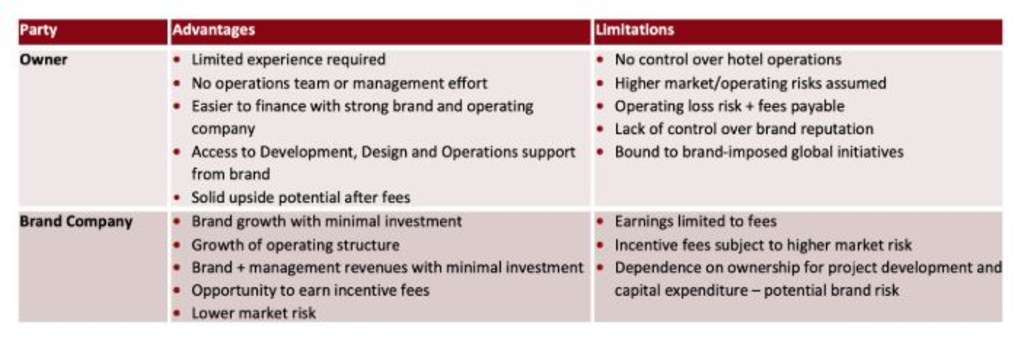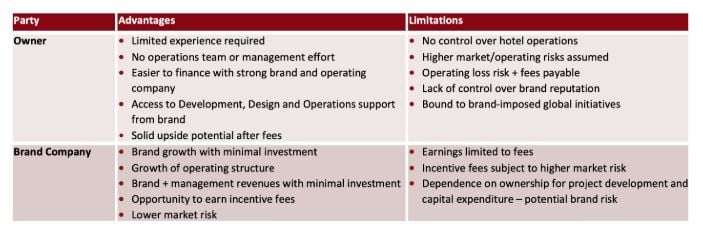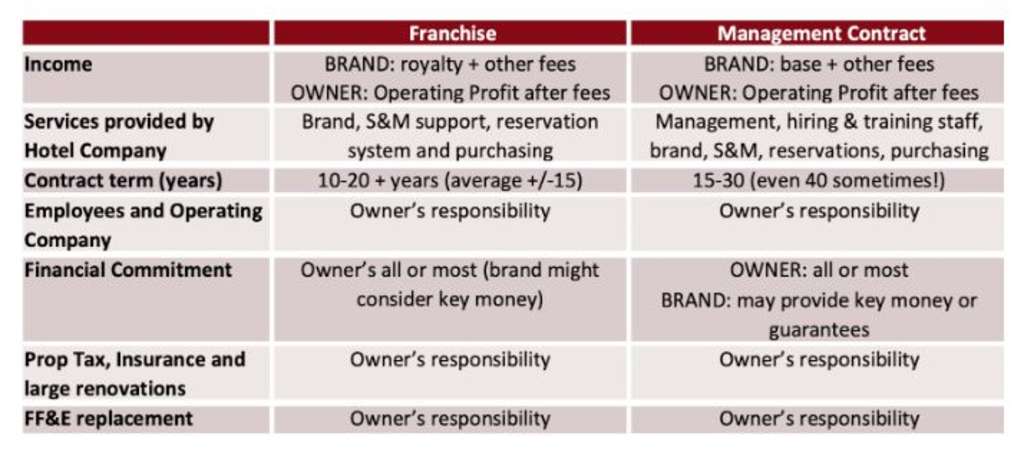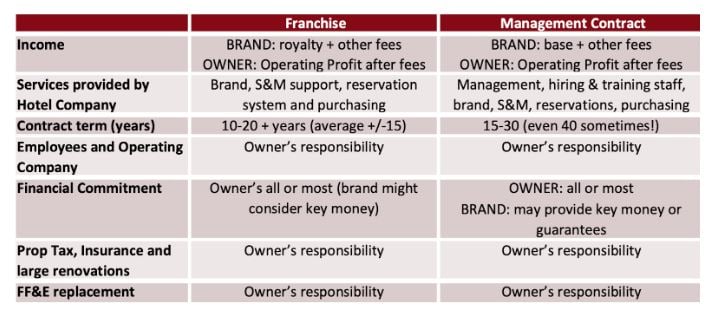Difference Between Hotel Managements Agreements and Franchise Operators
In the hospitality sector, there are number of key players and stakeholders that involved to run a successful hotel. Hotel brands, hotel owners and management companies often work together to create transformations and combinations of operating models to maximize the profitability and increase guest satisfaction. The question to the hotel owner is that:"How to choose between a franchise operators' agreement or hotel management agreement?" and"What model is the most suitable for his/her hotel?". This article aims to give a short overview and comparison between the two hotel operating models.
1. Hotel Management Agreement (HMA)
Hotel brand/operator will be responsible to manage the hotel by providing supervision, direction, and expertise through conventional methods and measures. It will fundamentally take over the operations of the hotel for and on behalf of the hotel owner for a fee.
Given this scenario, the hotel brand (such as Marriott, IHG, Hilton, Accor/SBE) is the manager and the hotel owner is the managed owner. They signed a Hotel Management Agreement for a specific hotel brand (such as Ritz Carlton, Sofitel). The hotel owner will bear all the operating risk. They also require paying a base fees, brand trademark, incentive fees, marketing fees, distribution and loyalty fees, IT fees and many more. Hotel management agreements can be long and complex.
Hotel Management Agreement Advantages and Disadvantages
2. Franchise Operators Agreement
The franchise agreement is a legal license agreement between the hotel brand and the hotel owner that give hotel owner the rights and obligations to operate the hotel under the franchisor's brand in exchange for fees.
Given this scenario, the Hotel Brand (such as Marriott, IHG, Hilton, Accor/SBE) is the franchisor, and the hotel owner is the franchisee. They sign a Franchise Agreement for a specific hotel brand (such as Ritz Carlton, Sofitel). The hotel owner will bear all risks like HMA, but they will hold control of the hotel asset. They also require paying a franchise fees, brand trademark, incentive fees, marketing fees, distribution and loyalty fees, IT fees and many more.
Franchise Operators Agreement Advantages and Disadvantages
The two models described above provide a range of options with example of benefits and limitations that make them more or less attractive depending on the requirement, priorities and profile of the hotel owner. Moreover, the table below illustrate the comparisons between Franchise and Management Contract in term of income, services provided by hotel brand, contract term, employees, financials commitment and other cost.
Comparison of the two models
According to HVS study in 2015, Franchise agreement accounted a hefty portion of major hotel chain's portfolio more than in Europe as shown in the pie chart below. HVS also noted that Franchise Agreement will most certainly continue to rise due to the number of reasons "Franchising will likely continue to gain ground as the preferred operating model for a number of reasons: major chains have placed increasing emphasis on franchising to meet their desired expansion pace; Third Party Operators have proven competent in bridging the gap between owners and brand companies; and small independent hotels in secondary locations turn to flexible, less-standardized franchisors to remain competitive."
In conclusion, there are several factors to determined which operating model is the right fit for the hotel. For instance, the experience and the risk appetite of the owner, the size and standard of the hotel property, the suitability and availability of potential brands, etc.
However, all in all, management contract allows the owner to get into hotel industry even with limited experience to run hotel and enjoy the profit when the business is doing well. But this comes with the cost of greater operating and market risk while the hotel brand will deal with all the management matters. On the other side of the argument, Franchise Agreement provide the owner the right to operate the hotel themselves under a brand name or flag and to have access to the technology capabilities, distribution and marketing systems in exchange for loyalty fees. This is appropriate for hotel owners who already have hotelier experience and want to have a daily involvement operate their own hotel.
Korosh Farazad
Founder and Chairman of Farazad Group of Companies
Farazad Group Ltd.







